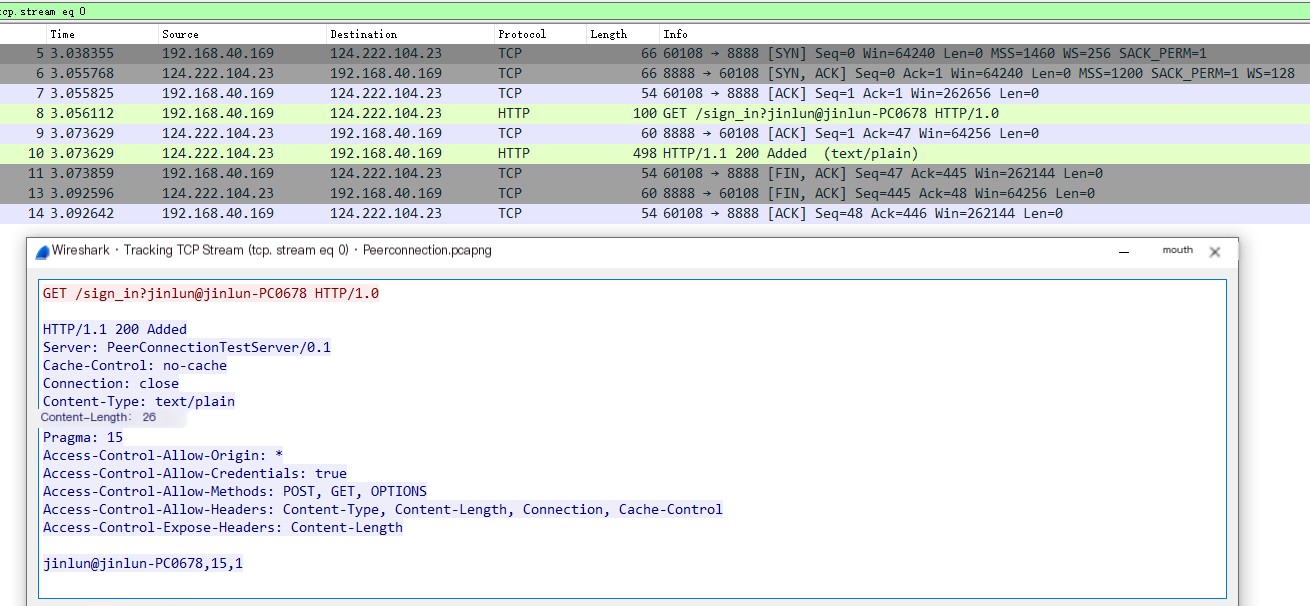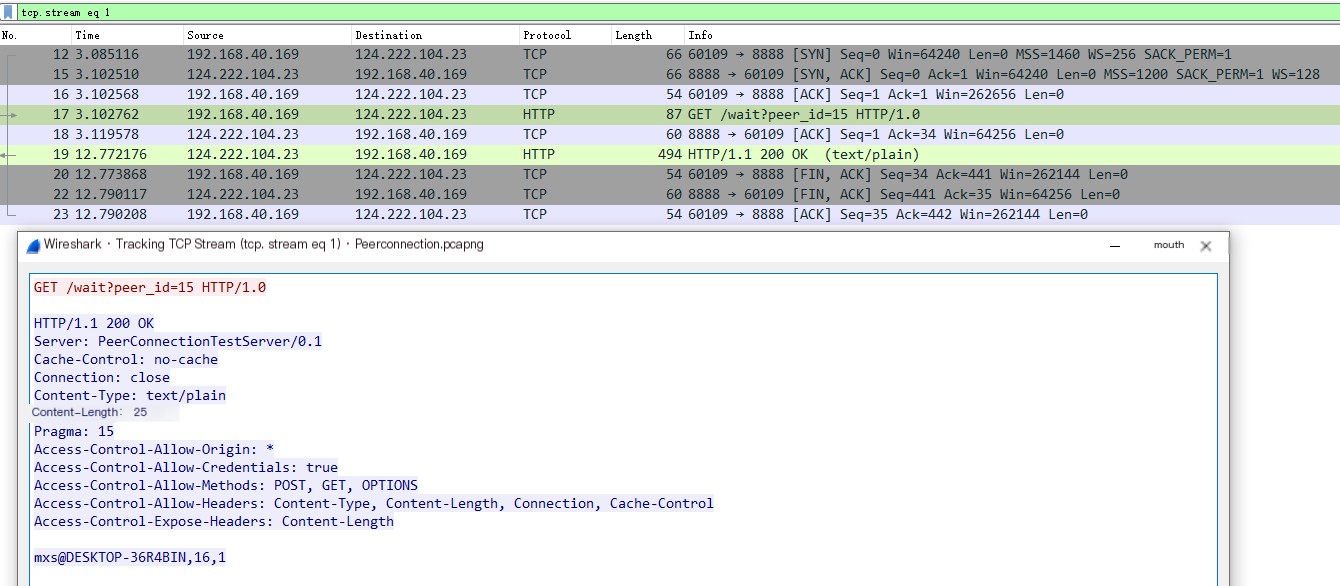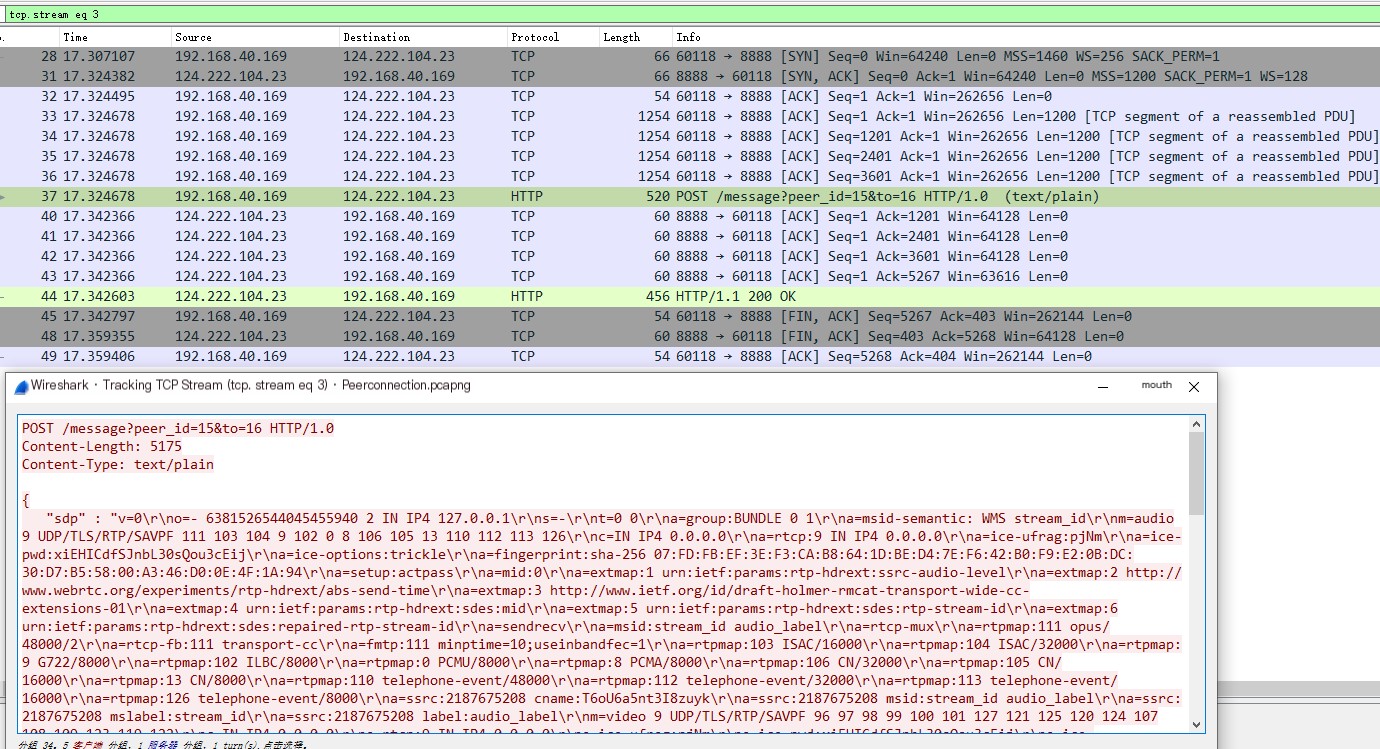Continuing from the previous article, the first task after compiling WebRTC was to debug and analyze the peerconnection_client. I set up the peerconnection_server on a public server, while the peerconnection_client was run on two PCs—one laptop and one desktop. I analyzed the process using packet capture to monitor HTTP data exchange. [Click here to download the packet capture file](https://files.cnblogs.com/files/shawn-meng/peerconnection.pcapng.7z?t=1647592120).
sign_in
The peerconnection_client uses a socket to send HTTP data to send the sign_in command to the peerconnection_server
The peerconnection_server responds with 200 OK, indicating that the peerconnection_client has registered. The corresponding code After the peerconnection_client clicks the connect button, through a series of redirects, calls the function void Conductor::StartLogin() –> void PeerConnectionClient::Connect() –> void PeerConnectionClient::DoConnect()
//peer_connection_client.cc//I modified the coding stylevoid PeerConnectionClient::DoConnect() { control_socket_.reset(CreateClientSocket(server_address_.ipaddr().family())); //Create a socket hanging_get_.reset(CreateClientSocket(server_address_.ipaddr().family())); //Create a socket InitSocketSignals(); char buffer[1024]; //Set the data for the sing_in command, send HTTP data within the raw socket snprintf(buffer, sizeof(buffer), "GET /sign_in?%s HTTP/1.0\r\n\r\n", client_name_.c_str()); onconnect_data_ = buffer; bool ret = ConnectControlSocket(); //socket connect server if (ret) { state_ = SIGNING_IN; } if (!ret) { callback_->OnServerConnectionFailure(); }}//Settings for the socket's operational events, OnClose, OnConnect, OnReadvoid PeerConnectionClient::InitSocketSignals() { RTC_DCHECK(control_socket_.get() != NULL); RTC_DCHECK(hanging_get_.get() != NULL); control_socket_->SignalCloseEvent.connect(this, &PeerConnectionClient::OnClose); hanging_get_->SignalCloseEvent.connect(this, &PeerConnectionClient::OnClose); control_socket_->SignalConnectEvent.connect(this, &PeerConnectionClient::OnConnect); hanging_get_->SignalConnectEvent.connect(this, &PeerConnectionClient::OnHangingGetConnect); control_socket_->SignalReadEvent.connect(this, &PeerConnectionClient::OnRead); hanging_get_->SignalReadEvent.connect(this, &PeerConnectionClient::OnHangingGetRead);}After the socket successfully connects to the peerconnection_server, it triggers the OnConnect callback, where the sign_in command is sent.
void PeerConnectionClient::OnConnect(rtc::AsyncSocket* socket) { RTC_DCHECK(!onconnect_data_.empty()); size_t sent = socket->Send(onconnect_data_.c_str(), onconnect_data_.length()); RTC_DCHECK(sent == onconnect_data_.length()); onconnect_data_.clear();}In void PeerConnectionClient::OnRead(rtc::AsyncSocket* socket), the server’s response is received.
wait
After sending a wait command, the peerconnection_server keeps hanging until it receives a new client connection, it only then responds, including the complete client list in the response. As shown below, the server takes 218 seconds until another client connects before responding. After a signaling exchange completes, the socket closes (short HTTP connection).
The hanging socket hanging_get_ initiates a connection in void PeerConnectionClient::OnRead(rtc::AsyncSocket* socket). In the connection callback function void PeerConnectionClient::OnHangingGetConnect(), the wait command is sent
void PeerConnectionClient::OnHangingGetConnect(rtc::AsyncSocket* socket) { char buffer[1024]; snprintf(buffer, sizeof(buffer), "GET /wait?peer_id=%i HTTP/1.0\r\n\r\n", my_id_); int len = static_cast(strlen(buffer)); int sent = socket->Send(buffer, len); RTC_DCHECK(sent == len);} Then in void PeerConnectionClient::OnHangingGetRead(rtc::AsyncSocket* socket), the server’s response is received. The callback to void Conductor::OnPeerConnected(int id, const std::string& name) displays the peer list in the window.
Connect to Peer
By double-clicking the peer’s name in the window, the connection request is triggered, and the offer is sent
Double-clicking the peer’s name initiates the function void Conductor::ConnectToPeer()
void Conductor::ConnectToPeer(int peer_id) { RTC_DCHECK(peer_id_ == -1); RTC_DCHECK(peer_id != -1); if (peer_connection_.get()) { main_wnd_->MessageBox("Error", "We only support connecting to one peer at a time", true); return; } //Initialize audio and video if (InitializePeerConnection()) { peer_id_ = peer_id; //Generate offer SDP information peer_connection_->CreateOffer(this, webrtc::PeerConnectionInterface::RTCOfferAnswerOptions()); } else { main_wnd_->MessageBox("Error", "Failed to initialize PeerConnection", true); }}


